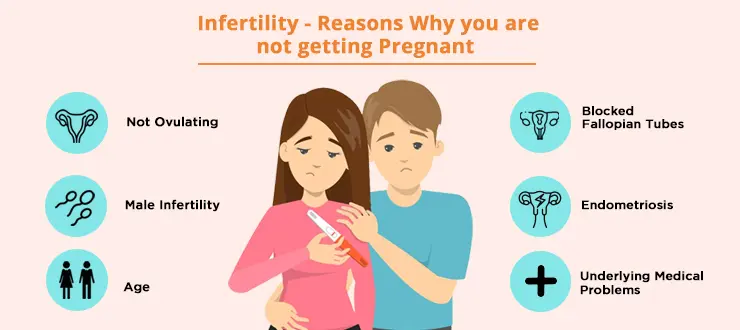What Causes Infertility?

It’s tough. You’ve been with your partner for quite some time now. Now, you come to a point where you want to raise a family. You fancy yourself being surrounded by kids. Imagine how happier life could be with children you can call your own…
The problem is you can’t conceive a child. That is very depressing. You are engulfed with envy every time you see other couples doting on their kids. How you wish you could live even for a day in their shoes.
Infertility is a problem affecting many couples nowadays. It is due to several factors, both internal and external. This condition is caused by both male and female partners. Women contribute roughly 60% of the part of the problem.
This condition is traditionally defined as the inability to conceive a child. Despite numerous occasions of sexual intercourse without any contraceptives, some people still find it challenging to have a child.
Men produce sperm throughout their lives. The case is quite different with women. The number of eggs they make during their reproductive years declines typically as they get older.
Factors That Can Contribute To Infertility
Failure to conceive does not necessarily involve any defect in the reproductive organs. Other non-physical factors are known to potentially cause this condition, such as stress, depression, emotional issues, or side effects from medication.
These are some of the known causes. Infertility may be caused by one of these factors or a combination of any or all of the following.
Ovulatory Disorders
Failure to ovulate is one of the most common causes. Problems relating to ovulation may be caused by hormonal imbalances, scarred ovaries, early menopause, and “un-ruptured follicle.”
Tubal Defects
Diseases affecting the fallopian tubes account for roughly 25% of those diagnosed with infertility. Such tubal defects may be characterized by different degrees of adhesions or partial or total tubal blockade. Tubal disorders may be caused by infection (STDs), abdominal defects, adhesions from previous surgical operations, ectopic pregnancy, and hereditary factors.
Cervical Factors
Involve sperms’ immobility due to cervical problems. Sperms cannot pass through the uterus if there is insufficient aid in cervical mucous that will send it towards its destination. Other known cervical factors include stenosis, sexually transmitted diseases, and “sperm allergy.”
Pelvic Problems
These include scarred tissues in this part of the body, endometriosis, defective fallopian tubes, and even fibroids.
Uterine Disorders
Problems relating to the uterus, such as thin linings in the uterine and even abnormalities in uterine anatomy, cause infertility in women.
Behavioral Causes
Certain habits may have health repercussions and may contribute to a couple’s ability to conceive. Such behaviors are under our control. It is just a matter of the exercise of our will to abandon such undesirable habits. Such habits include an unhealthy diet without exercise, smoking, substance abuse, and alcohol intake,
Occupational Hazards
Some occupations may hinder a person from becoming fertile. Studies suggest that exposure to certain types of hazardous chemicals may cause infertility in both men and women.
Knowing such contributing factors that can cause infertility may help us determine the right option to treat infertility. Becoming a mother is inexplicably vital to many women. There’s no happier moment in a woman’s life than seeing a newly-born baby in her arms.
Trending Health Topics
- ADHD
- Allergies
- Arthritis
- Bipolar Disorder
- Bunions
- Car Accidents
- Chron's Disease
- Common Cold
- COPD
- Depression
- Dry Skin
- Dry throat
- Eczema
- Fungal Infection
- GERD
- HIV/AIDS
- Hypertension
- Irritable Bowel Syndrome (IBS)
- Multiple Sclerosis
- Osteoarthritis
- Psoriasis
- Rheumatoid Arthritis
- Skin Disorders
- strep throat
- Type 2 Diabetes
- Uncategorized